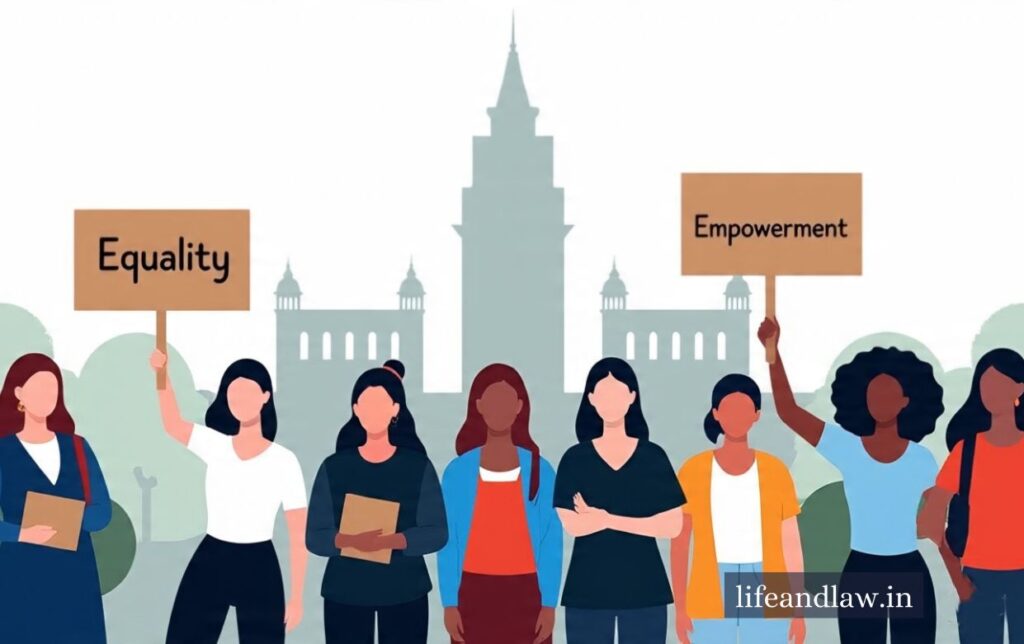Trending

Every year, August 26th is Women’s Equality Day, a day to recognise the progress made in promoting women’s rights while also highlighting the continuing obstacles. This day is a strong reminder of women’s strength, accomplishments, and ongoing fight for justice, equality, and respect around the world.
This article intends to investigate the critical impact of legal reforms in influencing women’s empowerment. It investigates how the law has served as both a barrier to injustice and an instrument for reform. But it also raises important questions: are these laws sufficient, and do they genuinely reach every woman?
Historically, women were denied most legal and political rights. Many nations’ laws were designed with male supremacy in mind, from voting rights to inheritance, education to employment. Change only began to take shape after centuries of advocacy and communal effort.
Several historic developments in the twentieth century transformed women’s legal rights. Many countries passed laws establishing universal suffrage, equal education rights, and workplace protections. On a global scale, the Convention on the Elimination of All Forms of Discrimination Against Women (CEDAW), signed in 1979, represented a watershed moment by recognising women’s rights as human rights.
Even as legislation evolved, enforcement remained spotty, and cultural norms resisted change.
Legal protections are the foundation of any just society. Throughout history, several laws have been created to safeguard women’s equality in both the public and private realms. Here are some of the most important ones:
Violence is still one of the most fundamental hurdles to women’s equality. Laws against domestic violence, sexual harassment, marital rape, and acid attacks are critical tools in this campaign.
For example:
The Protection of Women from Domestic Violence Act offers victims urgent refuge and shelter.
Laws such as POSH (Prevention of Sexual Harassment at Workplace) require safe workplaces for working women.
Stricter penalties for sexual assault and rape under criminal statutes are intended to serve both justice and deterrence.
However, these rules are only as effective as they are enforced, and many cases go unreported owing to fear or social disgrace.
Legal laws currently seek to ensure equal pay, maternity benefits, and protection from gender-based discrimination in the workplace. Women no longer have to choose between parenthood and a profession, at least legally.
In some regions, reservation policies in politics or education seek to close gender gaps, allowing women to lead and influence policy.
Autonomy and equality are fundamentally linked to women’s control of their bodies. Laws that provide access to abortion, contraceptive rights, and maternal healthcare are critical.
For example, progressive abortion laws not only allow women the choice to choose, but they also minimize dangerous medical procedures that endanger women’s lives.
To assist women in navigating legal processes, several countries have developed legal aid cells, women’s helplines, and fast-track courts. These are intended to allow quick, accessible, and sensitive management of gender-based situations.
Even these innovative initiatives encounter logistical and societal challenges.
Regardless of the legal framework, women frequently find themselves fighting not only abusers, but systems that stall or prevent justice.
Lack of awareness: Many women, particularly those from rural or marginalised communities, are uninformed of their rights.
Stigma and Silence: Cultural conventions inhibit reporting crimes, particularly sexual offences.
Delays and Insensitivity: Courts are backlogged, and law enforcement may lack gender sensitivity training.
Even the most progressive legislation loses its impact due to the gap between law and lived reality.
Legal reform is critical, but law alone is insufficient. Laws represent a society’s values, yet those values must evolve. For women to be fully equal, education, awareness, and cultural change are essential.
Families, schools, workplaces, and the media must all promote gender equality. Men must join the movement as allies, supporters, and champions. Gender justice is not a “women’s issue”; it is a communal one.
On this Women’s Equality Day, let us remember that justice extends beyond the courts. It is about creating a world in which every woman feels heard, valued, and safe. True equality must exist not only in legislation, but also in everyday life – from boardrooms to homes, from school to work.
As a legal practitioner, Adv. Abdul Mulla is dedicated to raising awareness about women’s legal rights and increasing access to justice through his platforms www.asmlegalservices and www.lifeandlaw.in. This article urges readers to educate, challenge bias, support women-led efforts, and demand accountability — since women’s rights are human rights, and legislation serves as the basis for change.
Let the law be more than simply a rulebook — a pledge of justice, equality, and respect for all women.
Adv. Abdul Mulla (Mob. No. 937 007 2022) is a seasoned legal professional with over 18 years of experience in advocacy, specializing in diverse areas of law, including Real Estate and Property Law, Matrimonial and Divorce Matters, Litigation and Dispute Resolution, and Will and Succession Planning. read more….
Copyright BlazeThemes. 2025